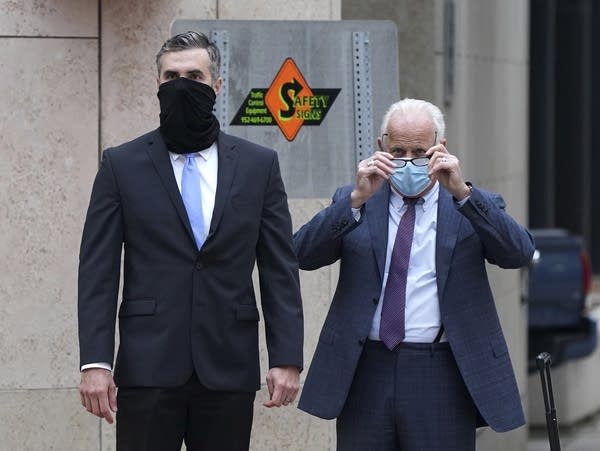Ex-cop Thomas Lane sentenced to 3 years for his role in George Floyd's killing

Updated 9:40 a.m.
Former Minneapolis police officer Thomas Lane was sentenced Wednesday morning to three years in prison for his role in George Floyd’s killing.
The sentence was a downward departure from state guidelines. Prosecutors agreed to the move, saying Lane was “less culpable” in Floyd’s killing than the other officers.
Judge Peter Cahill sentenced Lane to 36 months in prison with credit for 31 days served. The sentence will be served at the same time as his federal sentence for violating Floyd’s civil rights, which means he won’t serve additional prison time due to this state sentence.
Prosecutor Matthew Frank read a statement from Floyd’s family where they expressed exhaustion with the continued legal proceedings about Floyd’s killing, which will include another trial in state court next month. Still, the family vowed, “We will always show up for George Floyd, but never move on.”
Lane didn’t make any comments during the hearing, which lasted less than 10 minutes.
Create a More Connected Minnesota
MPR News is your trusted resource for the news you need. With your support, MPR News brings accessible, courageous journalism and authentic conversation to everyone - free of paywalls and barriers. Your gift makes a difference.
“I think it was a very wise decision for you to accept responsibility and move on with your life, even though the Floyd family has problems, understandably so, with moving on with their own lives,” Cahill told him
Lane pleaded guilty in state court in May to aiding and abetting manslaughter in exchange for the three year sentence, which he’ll serve at the same time as his federal sentence for violating Floyd’s civil rights. State prosecutors also dropped a more serious charge of aiding and abetting murder in exchange for Lane’s guilty plea.
Lane was the officer who held down Floyd’s legs while Derek Chauvin kneeled on Floyd’s neck for more than nine minutes. Lane asked Chauvin twice whether they should flip Floyd over so he could breathe but Chauvin brushed off the suggestions.
Lane appeared for his state sentencing hearing by video from a minimum-security federal prison in Englewood, Colo., where he's serving his two-and-a half year federal prison term.
Former officers J. Alexander Kueng and Tou Thao rejected plea deals from the state similar to Lane’s. They’re expected to be tried on Oct. 24 on charges of aiding and abetting murder and manslaughter. It would be the third trial in Floyd’s killing involving the same circumstances and most of the same evidence and witnesses.
Thao and Kueng were convicted in February in federal court of failing to intervene with Chauvin and failing to provide Floyd with medical care. In July, Thao was sentenced in federal court to three and a half years and Kueng was sentenced to three years.
Chauvin is serving around 20 years concurrently for both his state murder conviction and his federal conviction for violating Floyd’s civil rights. He’s being held in a medium-security federal prison in Tucson, Ariz.
On May 25, 2020, Lane and Kueng responded to a call that a man tried to pass a counterfeit $20 bill at a corner store on Minneapolis’ south side. Within moments of confronting Floyd, Lane drew his firearm. He and Kueng tried to force Floyd into the back of a squad, but then took him to the pavement outside with the help of Chauvin, who kneeled on Floyd’s neck even after Floyd stopped talking or moving.
Floyd’s murder led to unrest across the Twin Cities, and sparked protests across the country. The Minneapolis Police Department is currently under a patterns or practices investigation by the United States Department of Justice, which could lead to a consent decree.